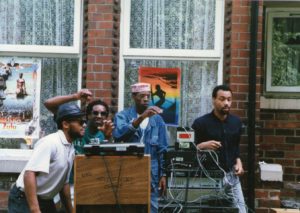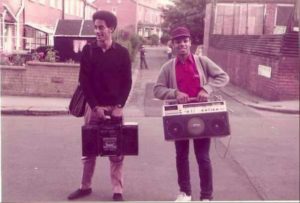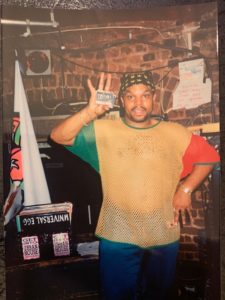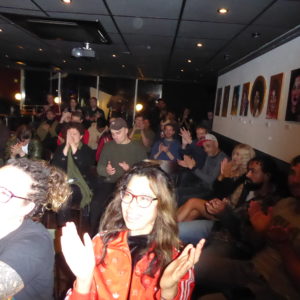Reflections on ‘In A Vanguard Style: A Documentary on Iration Steppas’
Intergenerational links in the SST scenes and the archiving of the culture by practitioners are two areas of pivotal interest for the SST research. Both themes reverberate strongly in the movie ‘In A Vanguard Style: A Documentary on Iration Steppas’, currently being premiered around the world before the official launch in February 2022.
The story of the Leeds-based sound system and dub output stands as a testament to the importance of the British sound system culture as a site of music innovation and technological experimentation. More interestingly, the movie has been produced by the Dubquake record label, run by the prominent French sound system OBF, who credits Iration Steppas as its main influence. Both a tribute and a labour of love, the movie helps to shed light on a grassroots cultural history which often remains untold.
In this piece, Reggae historian and music journalist David Katz reflects on the movie following a crowded Brixton screening held on November 10, 2021.
—
The film In A Vanguard Style: A Documentary on Iration Steppas does more than just shed light on the history and evolution of this ground-breaking sound system and dub production outfit. By working in the contextual backstory and including select testimony from key collaborators, the film allows us to consider the greater importance of their gradual rise, the influences and approaches that helped make Iration so distinctive, and the specificities of their emergence as a sonic expression of the musical culture of the Black British North.
During the last fifty years, dub’s complex and multifaceted evolution has seen its initial audio river diverge to different streams and tributaries. What began in Jamaica in the late 1960s and early 70s as an intriguing element of sound system culture found different resonance in Britain, where members of the Jamaican diaspora and Black British youth reshaped the genre to suit their own sensibilities, not only in London enclaves such as Brixton and Harlesden, but also in the Black districts of cities like Birmingham, Bristol, and Liverpool. Then, from the mid-1980s, after advances in multitrack technology saw a shift to synthesizer-driven dancehall in Jamaica, the ‘UK steppers’ style was born, wherein Britain’s Black and white dub heads began fashioning keyboard-driven computer rhythms in tiny home studios, keeping the dub flame alive in a further unexpected mutation.

Ina Vanguard Style Documentary Poster
During the early 1990s, Iration Steppas was officially launched as a sound system, issuing powerful and futuristic dub productions on the side. Their wide-ranging influence has since taken root across Europe as well as in more distant territories such as Japan, Brazil and Mexico, their unique blend of techno rhythms, live bass and custom effects drawing a large and loyal following; such is the reverence accorded these dub vanguards that the documentary was conceived for France’s Dubquake Records, directed by Fabien Jupille and produced by Rico, head honcho of the Eropean sound system and record label, OBF (Original Bass Foundation), based on the border of France and Switzerland.
The film makes clear that, although Iration Steppas officially formed in 1990, the story begins much earlier and is strongly rooted in Chapeltown, an outlying neighbourhood of the formerly industrial northern town of Leeds, which has a particular history: what was once a wealthy suburb in the early Victorian age then went into decline, first becoming a relocation point for Jews fleeing the pogroms of eastern Europe, and later a place of widespread Caribbean immigration in the years following World War II, with transplanted Jamaicans constituting a majority. In fact, a significant Caribbean presence was already established during the War, as evidenced by the first Leeds Carnival, staged in 1941, but during the 1970s and 80s, hostile policing, widespread unemployment and racial tensions led to rioting in 1975, followed by further disturbances in 1981, when several British cities erupted due to racists incidents, and another in 1987, this time sparked by the beating of a Black teenager by the police.

Mark at the decks in the early days (King Melchesedec Chant)
Against this charged and turbulent backdrop, Iration Steppas’ founder, Mark Iration, began his journey in music through a love of reggae and a fascination with technology; in the film, there is evocative footage of Mark boogieing away to some early 80s dancehall at a house party, and he describes cruising the streets with a massive ghetto blaster, linking it to another that his friend Sam Mason commandeered, to rumble the roads with bass music, sometimes taped off the radio broadcasts of John Peel and David Rodigan. His mother and cousin both describe Mark as obsessed with music from a young age, skulking out of an autobody work apprenticeship to concentrate on playing his tunes, and Mark naturally began sneaking out at night to take in the local sound systems such as Magnum, Majestic, Bassline, Ras Sparta, and Emperor, as well as sets from London and Birmingham such as Jah Shaka, Fatman, Moa Anbessa, Sir Coxsone and Quaker City, as noted by the MC Mackie Banton, another long-time collaborator.
Soon, Mark was selecting for various local sound systems himself, until he became an integral part of a set called Conquering Lion, based in the nearby city of Bradford (and featuring future producer, the Rootsman), which was unusual, because sound systems tended to be strongly affiliated with one local neighbourhood, rather than making use of personnel from different towns. Then, after Conquering Lion became disillusioned with the direction of dancehall and the upsurge of slackness and gun talk in Jamaican music, in the late 1980s Mark and Sam Mason founded a sound system of their own called Ital Rockers, and Mark reveals in the film that he was not merely limiting himself to reggae and dub on the set, dropping hip-hop, house, garage and lover’s rock along with roots and dancehall, playing for free for an extended phase to build up the name. They were eventually able to upgrade from 15-inch bass bins to 18-inch and settled into a residency at a youth club in Bradford, drawing a loyal crowd of Black youth from Leeds and Huddersfield as well as Bradford itself, Ital Rockers building its reputation as a thriving party sound that played a range of music styles.
There is some splendid testimony from other sound system personnel who describe raiding building sites for wood to build speaker boxes, as Chapeltown began a process of gentrification, and fond memories are recounted of Venn Street in Huddersfield, a legendary site for sound systems, where Ital Rockers clashed with resident set Earth Rockers, circa 1989, and on another occasion, were blown out of the water by the power and magnitude of Jah Tubbys, another esteemed British sound system. Archive footage of the period brings the excitement of these heady days into focus, as well as the cultural relevance of such events.

Young Mark Iration and friend with their ghetto blasters, 1980s
A natural next step came in 1990, when Bassic Records released Ital Rockers’ 12-inch single, ‘Ital’s Anthem,’ the music positioned somewhere between dub, jungle, and acid house. Mark named the selector Miller Mackie as the person who changed his life by introducing him to house music; the Chicago house style particularly affected him, its 4/4 rhythm chiming with the steppers he would go on to champion. Dropping his productions on cassette tapes in underground clubs led to an approach from Warp Records, but Mark opted for the smaller Bassic, since Warp was already handling work by another Leeds outfit, LFO. There’a s funny aside when technical mentor and dance music producer Tom ‘Thumb’ Nicethings describes hanging out at the Crash Records Shop in the era, which led to collaborative work, and it is telling that he complains that Mark was always incomprehensibly happy, almost too happy, it seems, and anyone who knows Mark will understand the reference, since from that time till now, Mark Iration is someone who just radiates positivity, which is very unusual in an arena known for fierce competition, sabotage, and bitter disappointments, more than anything else.
Mark explains that, with money from the Bassic deal, he re-built his sound system as a bigger and heavier entity, but after tensions arose with a rival sound from Liverpool who had been trounced at a clash in Leeds, Mark disbanded Ital Rockers and started all over again with Iration Steppas, no longer a party sound, but now channelling a new style of dub. Joining Jah Shaka, Jah Tubbys, Abashanti and Channel One, Mark made new UK roots and dub the focus of the Iration Steppas sound system, with his own productions a key element of the mix. In the film, likeminded practitioners such as the Rootsman and Russ Disciples remind of the prejudice facing the UK steppers producers of the day, whose music was largely seen as second-rate and sub-standard, at least according to the mainstream British music press.

Mark proudly displaying a DAT cassette
When the Brixton-based bass player, dub producer and top skanking dance man Dennis Rootical came into the picture, things stepped up to another level. We learn of the Kitachi sub-project, who released dubby, junglist trip-hop tracks on the independent Dope on Plastic label in the mid-90s, before Mark and Dennis began concentrating on futuristic dub with a house undercurrent; Dennis reveals that he initially planned to collaborate with Dub Judah on that kind of work, but Judah’s response was lukewarm, whereas he and Mark shared likeminded enthusiasm. They thus began cooking up tunes like ‘High Rise Vibrations,’ referencing the tower block location of Mark’s studio, which pointed dub in a totally different direction, leading to new styles of free expression on the dancefloor, with followers enacting wild moves to the steppers beats. Footage of Mark and Dennis together reveals a close camaraderie and organic working method whose results often surprised its creators as much as their audience.
We learn of the crew’s pioneering move into DAT technology, which was highly controversial at a time when vinyl was the only acceptable format for dub plates, and as the scene continues growing in more recent years, it is clear that Iration Steppas have gone on to influence various forms of techno and post-punk indie music, working via a means of musical symbiosis, since Iration has drawn from those forms as well, and through the process, the team has become renowned internationally, now headlining festivals throughout Europe, instead of the basement dives and community centres of old. And even if the audience at the Sub Bub events they have co-hosted in Leeds since 1998 are majority white, its long-standing staging at the West Indian Cultural Centre heightens their community groundings.

Screening at the Ritzy cinema in Brixton, November 2021. Photo by David Katz.
In November 2021, it was an honour and a pleasure to host the London premiere of the film at Dub Me Always, the monthly reggae vinyl night I host at the venue Upstairs at the Ritzy in Brixton, and tickets sold out in a flash, though it has to be said that few regulars were in attendance that night, the crowd very young, white, and largely European, with a few elder Black sound system personnel perched on stools at the back. The film was rapturously received, and during the lively question-and-answer session that followed with Dennis Rootical, we got a sense of the openness that has always defined the shape and feel of Iration Steppas’ releases, Dennis emphasizing that the appeal of house music came partly because musicians and producers are always seeking inspiration from sounds that are outstanding and unique; he sees the introduction of house and techno elements as part of a natural process of progression, and made plain that he and Mark work so well together because of their similar openness and wide-ranging musical tastes.
Officially released by Dubquake in February 2022, In A Vanguard Style ultimately profiles the rich history of Iration Steppas, emerging from the vibrant sound system scenes of Leeds and the broader North, and ultimately highlights the key contribution they have made to the development of dub in Britain. Anyone interested in dub music and sound system culture will have much to glean.
(All images courtesy of Dubquake Records unless stated otherwise)
—
Born in San Francisco and long resident in London, David Katz is the author of People Funny Boy: The Genius of Lee ‘Scratch’ Perry and Solid Foundation: An Oral History of Reggae. He has produced documentaries for Public Radio International, including Ring the Alarm: A History of Sound System Culture and has hosted the monthly reggae vinyl night Dub Me Always since 2004. Visit him at www.davidkatzreggae.com
